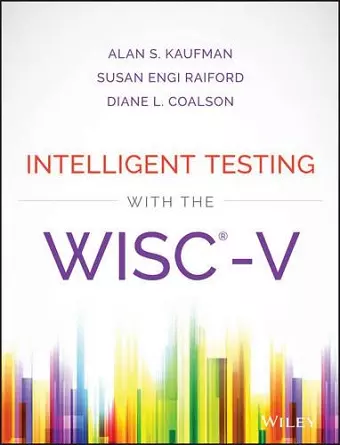Intelligent Testing with the WISC-V
Alan S Kaufman author Susan Engi Raiford author Diane L Coalson author
Format:Hardback
Publisher:John Wiley & Sons Inc
Published:16th Feb '16
Should be back in stock very soon

Interpret the WISC–V to help diagnose learning disabilities and to translate profiles of test scores to educational action
The Wechsler Intelligence Scale for Children—Fifth Edition (WISC–V) is a valuable tool for assessing children and adolescents with learning disorders—and Intelligent Testing with the WISC–V offers the comprehensive guidance you need to administer, score, and interpret WISC–V profiles for informing diagnoses and making meaningful educational recommendations. This essential resource provides you with cutting-edge expertise on how to interpret the WISC–V, which has an expanded test structure, additional subtests, and an array of new composites. Intelligent Testing offers valuable advice from experienced professionals with regard to clinically applying the WISC–V in an effort to understand a child's strengths and weaknesses—and to create a targeted, appropriate intervention plan. Ultimately, this book equips you with the information you need to identify the best theory-based methods for interpreting each child's profile of test scores within the context of his or her background and behaviors. Intelligent Testing provides a strong theoretical basis for interpreting the WISC–V from several vantage points, such as neuropsychological processing theory and the Cattell-Horn-Carroll (CHC) model, yet it permits you to interpret children's profiles using simple, straightforward steps.
The most frequently used IQ test in the world, the WISC–V (like previous versions of the WISC) plays an integral role in evaluating children for learning and intellectual disabilities, developmental and language delays, and gifted and talented classifications. As such, understanding how to use the latest version of WISC is extremely important when assessing children and adolescents ages 6 to 16 years.
- Explore all aspects of both the conventional WISC–V and WISC–V Digital
- Read objective, independent test reviews of the WISC–V from independent, highly-respected expert sources
- Review 17 clinical case reports that spotlight experiences of children and adolescents referred to psychologists for diverse reasons such as reading problems, specific learning disabilities, ADHD, intellectual giftedness, and autistic spectrum disorders
- Learn how a broad-based, multi-faceted approach to interpretation that calls upon several scientific concepts from the fields of cognitive neuroscience, clinical and school neuropsychology, neuropsychological processing, and the CHC model, can benefit children by providing meaningful recommendations to parents, teachers, and often to the children and adolescents themselves
- Use the results of WISC–V as a helping agent to assist in creating the best intervention plan, rather...
“The authors do an effective job of presenting all aspects and considerations practitioners need when using the WISC-V… Intelligent Testing with the WISC-V is a must read for anyone administering and/or using the WISC-V. This book serves as an administration companion, interpretation guide, reference book, and critical review of the WISC-V.” - Todd L. Chmielewski, PsycCRITIQUES, Vol. 62, No. 26.
"The book is overflowing with strengths, setting itself apart from other books on the WISC-V for several reasons. The most important one is the truly impressive history, knowledge, and experience the lead author has with the WISC, beginning with the WISC–Revised (WISC-R) and his relationship with David Wechsler. Alan Kaufman’s unique perspective with the history and development of the WISC allows the readers a unique viewpoint in understanding why changes were made or how decisions were decided in the development of the fifth generation of this test. Additional strengths of the text include the broadness of topics covered, application of various theoretical orientations to understanding and interpreting the test, and a summary of critiques by experts in the field. When attempting to developing critical thinking skills, few books provide the plethora of opinions and viewpoints from theoretically dissimilar experts that allows a reader to evaluate the various theories and approaches in a manner like this book does."—review from The Journal of Psychoeducational Assessment Ronald S. Palomares and Nadine E. Ndip, Texas Woman’s University, Denton, USA. Sage, September 2016.
ISBN: 9781118589236
Dimensions: 234mm x 196mm x 48mm
Weight: 1701g
832 pages